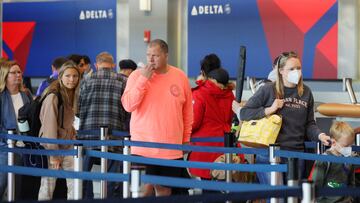CDC launches mask appeal: what are the consequences of ending mask-wearing?
A federal judge in Florida has struck down the federal face covering requirement for airplanes, but the Biden administration looks set to challenge the ruling.

It has emerged that the Centers for Disease Control and Prevention (CDC) will proceed with an appeal against the federal court decision to reverse the mask mandate which had recently been extended. A CDC statement released on Wednesday said that “masking in the indoor transportation corridor remains necessary for the public health.”
On Tuesday a federal judge in Florida had struck down a rule imposed by the Biden administration which required face masks to be worn on airplanes and other forms of inter-state public transport.
The ruling by US District Judge Kathryn Kimball Mizelle found that the CDC had exceeded its legal powers in extended the mandate until 3 May. This means that the federal transit authority can not currently enforce mask-wearing.
This dispute represents a significant point in the pandemic, which has now been affecting everyday life for more than two years. But what would an end of mask-wearing mean for covid-19 in the United States?
Evidence suggests that mask-wearing is effective
There have been numerous laboratory tests and wide-scale studies which have demonstrated that masks are able to prevent the transfer of respiratory droplets between people, reducing the risk of spreading covid-19.
The droplets are emitted when people cough, sneeze, sing, talk or breathe, but studies show that face masks can block up to 80% of them escaping into the air. If another person is wearing a mask, they are around 50% effective at preventing those droplets being inhaled.
In England, the requirement to wear a face covering was removed from 27 January 2022. At the time UK Health Secretary Sajid Javid explained the decision, saying: “Our vaccines, testing and antivirals ensure we have some of the strongest defences in Europe.”
However after the rule was removed there was a sudden and notable increase in the number of new covid-19 cases reported in England. During the week before mask-wearing requirements were removed, the seven-day average for case numbers had remained steady at around 80,000 per day.
From 31 January onwards, the seven-day average soared to 180,000 before falling again.
The timing of the surge in cases does seem to suggest that the end of mask-wearing requirements was probably the decisive factor. However it should also be noted that some other restrictions, such as covid-19 passports, also ended on 27 January and so could also have played a part.
Furthermore, even without mask requirements England has enjoyed a steady decline in case numbers despite the fact that all coronavirus restrictions have now been removed and society has returned to pre-pandemic status.
Evidence from the UK would suggest that face masks are an effective way to curb the spread of covid-19 and reduce case numbers, but illustrates that the threat of infection naturally becomes far less pronounced as we move away from the winter months.






